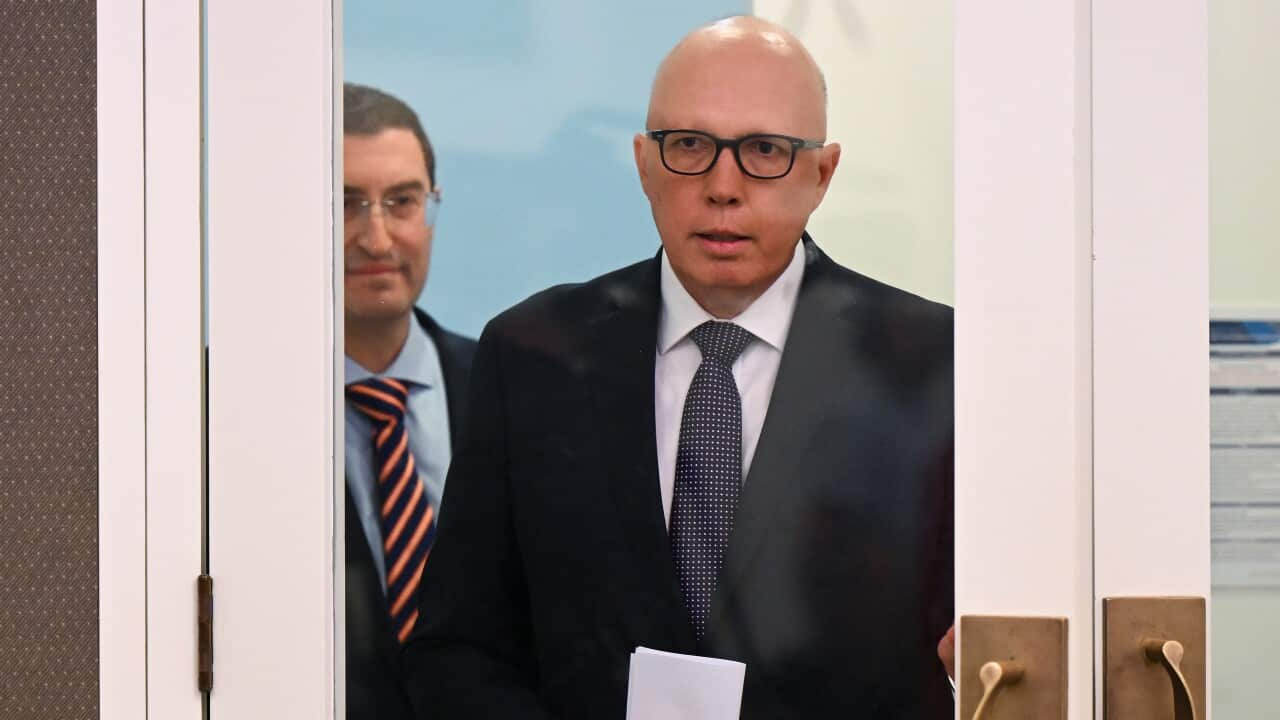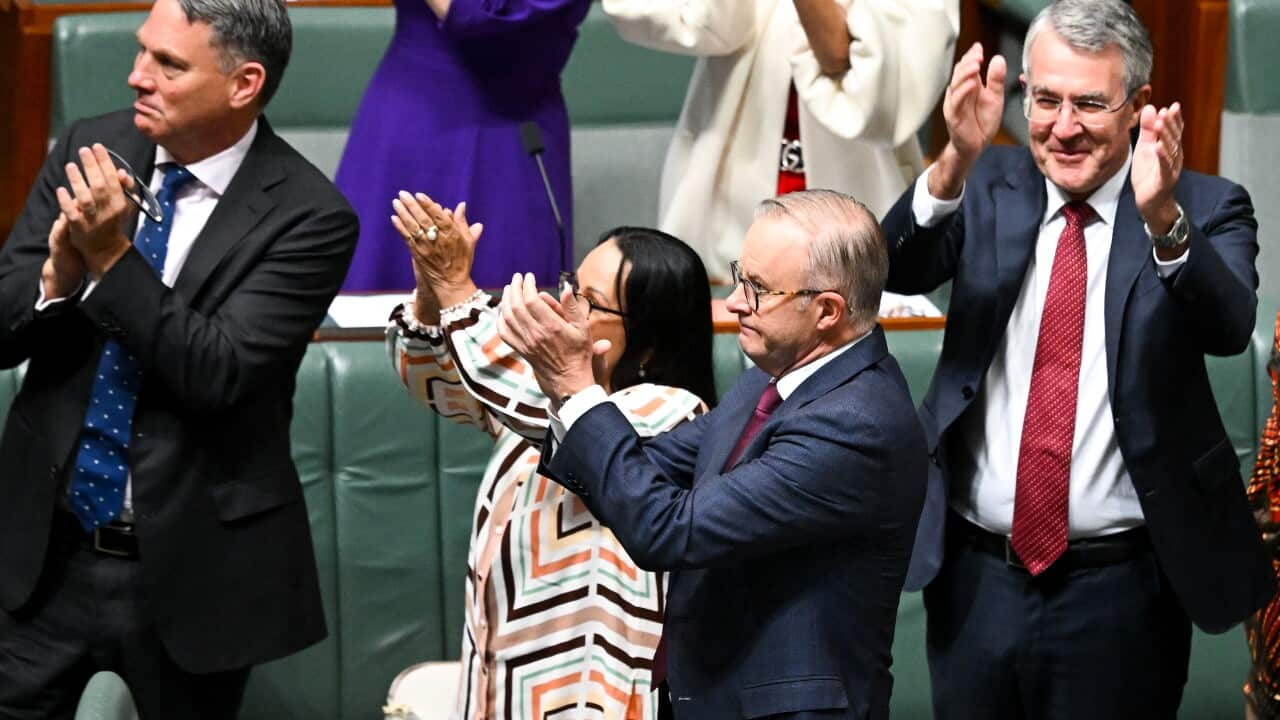KEY POINTS:
- The Liberal Party will formally oppose enshrining an Indigenous voice in the constitution.
- Mr Dutton said the Liberal Party wanted a legislated local and regional voice mechanism.
- The opposition will propose amendments to the model introduced to parliament by the government at the end of March.
The Liberal Party has delivered a "resounding no" to Prime Minister Anthony Albanese's model for a First Nations Voice to Parliament, leader Peter Dutton says.
But speaking after a special party room meeting in Parliament House on Wednesday, he said the major coalition partner would back constitutional recognition of Indigenous Australians and local and regional bodies to "get practical outcomes ... on the ground".
Liberal backbencher Bridget Archer has already attacked the decision as a "day late and dollar short". Ms Archer, , confirmed she will continue to campaign for the Voice regardless.
Mr Dutton accepted "three or four" backbenchers may follow suit, but insisted the "overwhelming majority" of Liberal MPs backed the stance he unveiled, claiming the wording would divide Australia.
"There was a resounding no to the prime minister's Canberra Voice (within the party room)," he said.
"It should be very clear to Australians by now that the prime minister is dividing our country and the Liberal Party seeks to unite our country. We want to make sure that we can get the best possible outcomes for Indigenous Australians."

Anthony Albanese says Mr Dutton has tried to undermine the Voice with 'every utterance'. Source: AAP / Lukas Coch
He again claimed Mr Albanese's proposed wording contradicted advice from the solicitor-general, which Labor denies, and said it was clear the prime minister didn't intend to change it.
He confirmed he would be actively campaigning against the Voice before the referendum, which will be held at the end of the year, saying a lack of detail over the body was "deliberate".
Deputy leader Sussan Ley insisted "today is not a no from the Liberal Party".
"It's a day of many yeses. Yes to constitutional recognition of Indigenous Australians. Yes to local and regional voices," she said.
"I stand here today disappointed with the prime minister, disappointed with his approach. It's his timeline. It's his question, and his refusal to meet anyone else halfway on anything is breathtaking in its arrogance."

Mr Dutton said there was a 'resounding no' to the wording unveiled by the Voice working group. Source: AAP / Lukas Coch
Moderate Liberals had been agitating for a conscience vote on the referendum, in line with the party's approach to the 2017 gay marriage plebiscite.
The announcement means that, barring an eleventh-hour change to the wording from Labor, both Coalition partners will campaign against the Voice after .
The decision is binding on shadow cabinet members, though Liberal Party rules would allow backbenchers to campaign for the Voice without repercussions.
No Australian referendum has passed without bipartisan support, though none has been held for over two decades.
Mr Dutton has consistently declined to state his own position, claiming Labor had provided insufficient detail on how the body would operate.
Minister for Indigenous Australians Linda Burney described the Opposition leader’s response as “predictable”, saying he had suggested no alterations during seven meetings with Mr Albanese.
Ms Burney noted the 2008 Apology to the Stolen Generations had been attended by “almost all others in the Parliament”, but not Mr Dutton.
“I hope Mr Dutton doesn't repeat his mistakes of the past. I know there are many good Liberal [MPs] and senators who support constitutional recognition,” she said.
“When we have power over our destiny, our children will flourish. They will walk in two worlds, and their culture will be a gift to their country.”

Linda Burney noted Mr Dutton had also boycotted the Apology to the Stolen Generations, urging him not to 'repeat his mistakes'. Source: SBS News
“This is not a political plaything. This is a decision that the Australian people will make, and I have faith in the Australian people,” she said.
Mr Dutton said he had the “utmost respect” for former Indigenous affairs minister Ken Wyatt and Indigenous leader Noel Pearson, both proponents of a national Voice, but said he had spoken to other leaders who opposed it.
“We live in a democracy. We consider the views of Indigenous and non-Indigenous Australians. My responsibility as the leader of the Liberal Party is to act in our country's best interests,” he said.
One Liberal MP breaks ranks on the Voice
It came as the latest Newspoll found overall majority support for the Voice, as well as a majority in all states bar Queensland. To pass, the referendum needs an overall majority as well as a majority in most states.
The only age demographic against the proposal was the 65 and over cohort, with strong support in the 18-64 age range.
“I think the numbers are very soft because I just think people have an inclination of doing whatever they can to support Indigenous Australians. That's how I feel,” Mr Dutton said
Some Liberals had been advocating for a free vote on the Voice to mimic the party's approach to the 2017 gay marriage plebiscite, which divided its moderate and conservative factions.
But Mr Dutton flatly rejected comparisons to 2017, saying "this not an issue of conscience, similar to the same-sex marriage debate".

Bridget Archer says she'll campaign for the Voice regardless. Source: AAP / Lukas Coch
“I'm not really surprised, but I am disappointed. I think that this has been some time in the making,” she said.
“The party needs to be prepared also for what comes from [this] … They need to be prepared for the fact that they will now be potentially associated with views, that frankly, I find anathema.”
Ms Archer described debate in the party room as “one-sided”, saying the party had been running a “not-so-soft” no campaign for months.
She did not answer directly when asked whether she supported Mr Dutton as leader, but insisted she will remain in the party.
“I want to see the Liberal Party return to what it once was, to the proud traditions, the proud values of the Liberal Party. Frankly, I think that we're still a long way from that."










